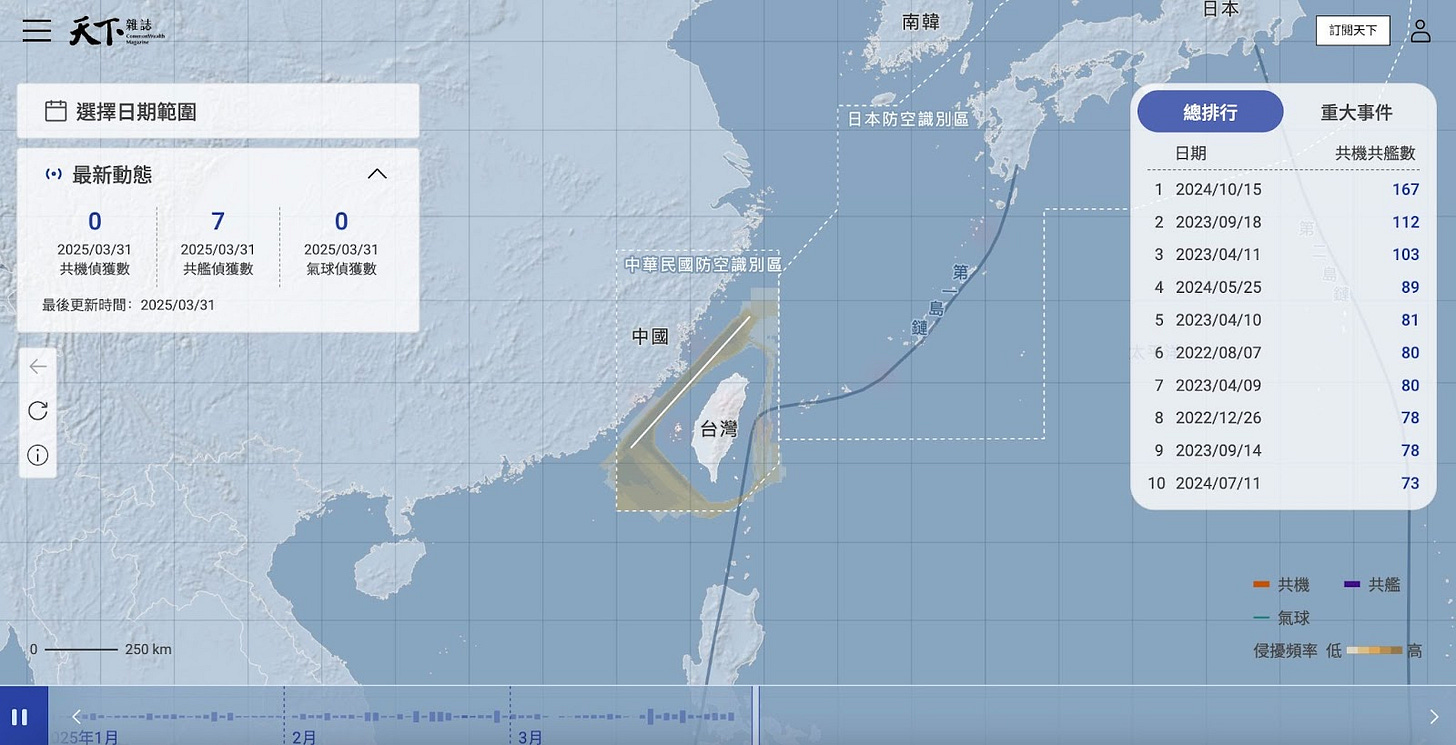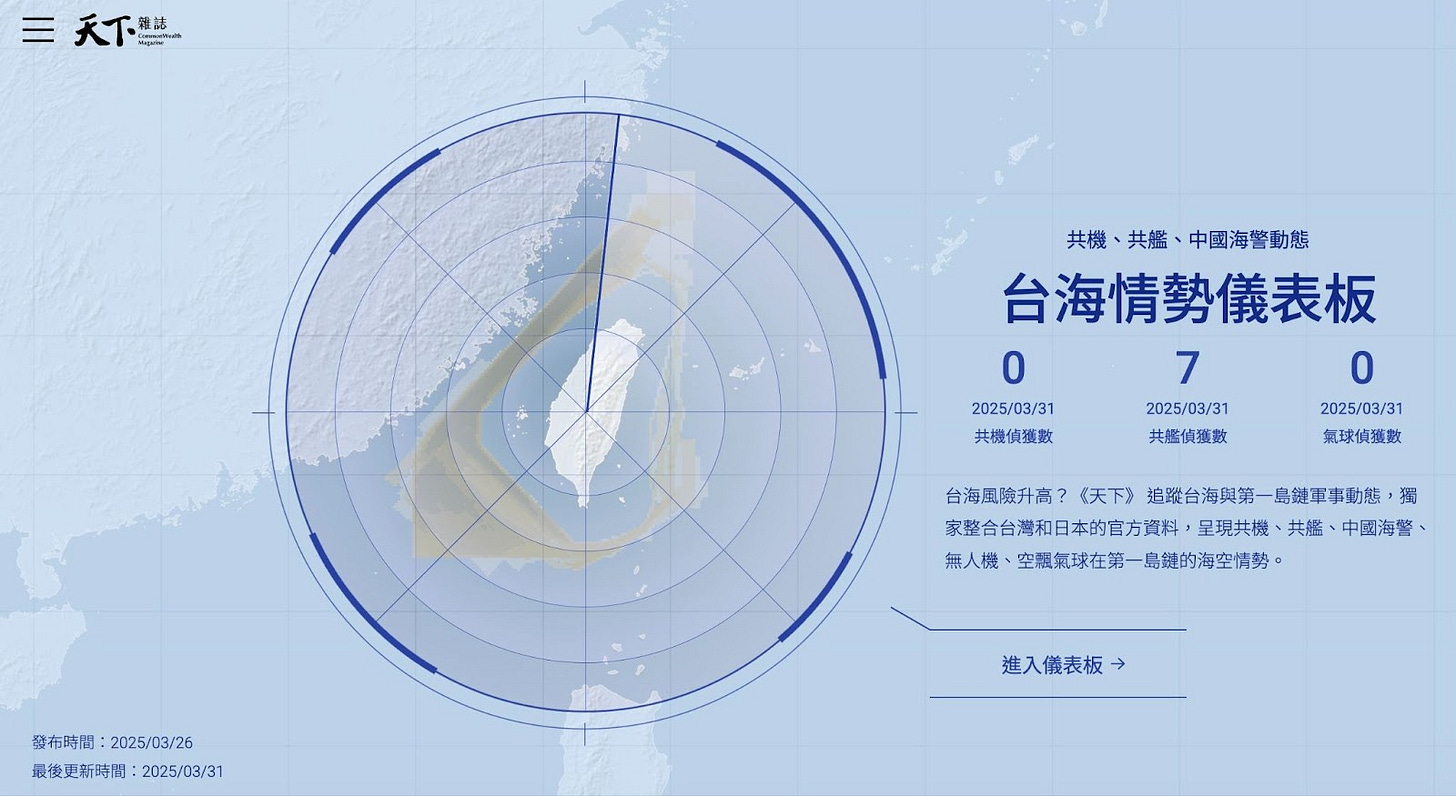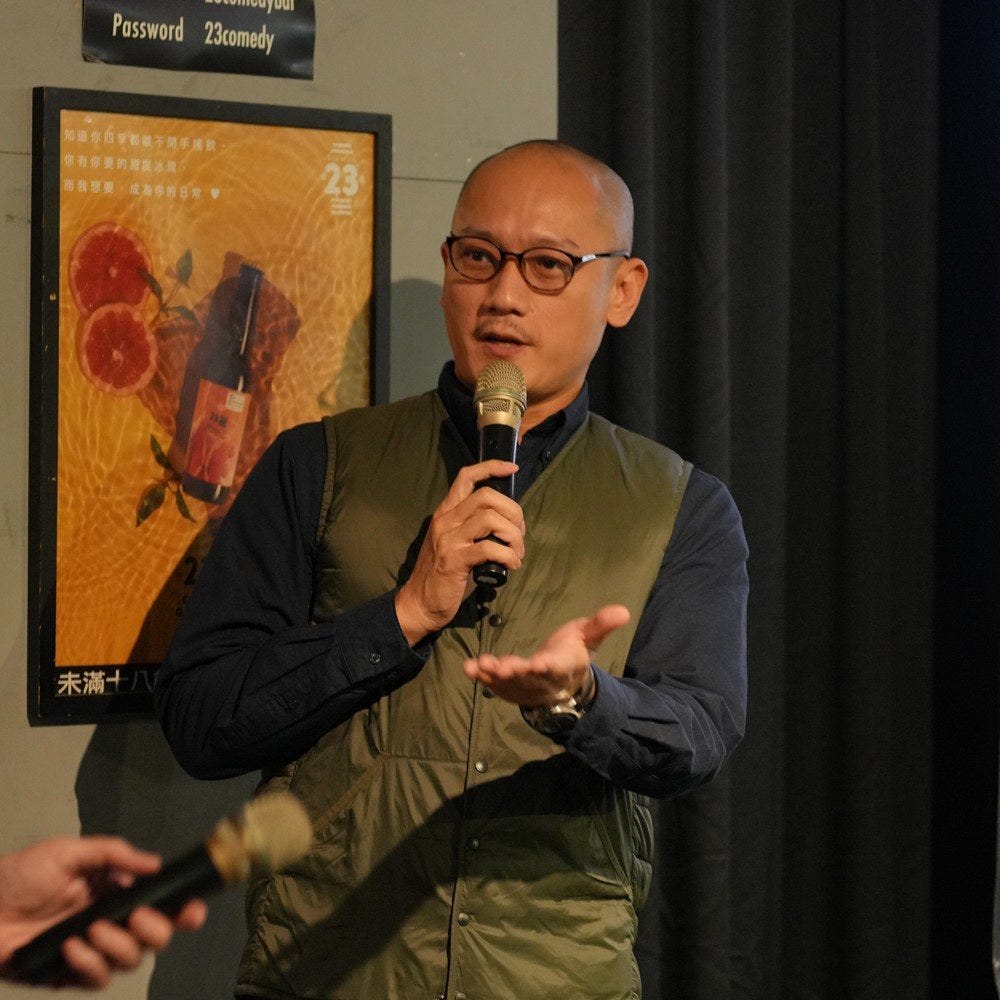Lingua Sinica Newsletter, 03 April
News, analysis, and commentary on Chinese-language media from the PRC and beyond.
Welcome back to Lingua Sinica.
China has concluded two menacing days of live fire drills in the Taiwan Strait, and across Taiwan today people are out and about in the sun, preparing for tomorrow’s Ching Ming Festival (清明節), or "Tomb Sweeping Day." It is a time when families honor ancestors by visiting graves, clearing weeds, and making offerings. Hardly solemn, the ritual of grave-tending generally involves convivial countryside outings and family picnics. Younger Taiwanese have learned to incorporate digital memorials alongside these traditional practices, and Now News (今日新聞) reports today that 17 local governments now offer online memorial services for those unable to visit ancestral graves in person.
Turning to the media this week, China's drills, which began on Tuesday, were accompanied by sickening rhetorical attacks from the People's Liberation Army (PLA), which likened Taiwan's President Lai to a "parasite" expelling larvae to gnaw away at the island’s well-being. China’s aggressive actions, meanwhile, were rationalized in a propaganda video shared across PRC state media as a mythical quest to "vanquish evil” — using supernatural imagery borrowed from a blockbuster video game (more in our post “War Games”).
The intimidating face presented to Taiwan by the PLA's Eastern Theater Command stands in stark contrast to another Chinese propaganda video released through social media today by China's Ministry of Foreign Affairs (MFA). In this video, directed toward a world confronting the punitive tariffs and aggressive rhetoric of the Trump administration, China portrays itself as the bringer of "shared prosperity" and creator of "opportunity for all" — against the hegemonism and greed of the United States.
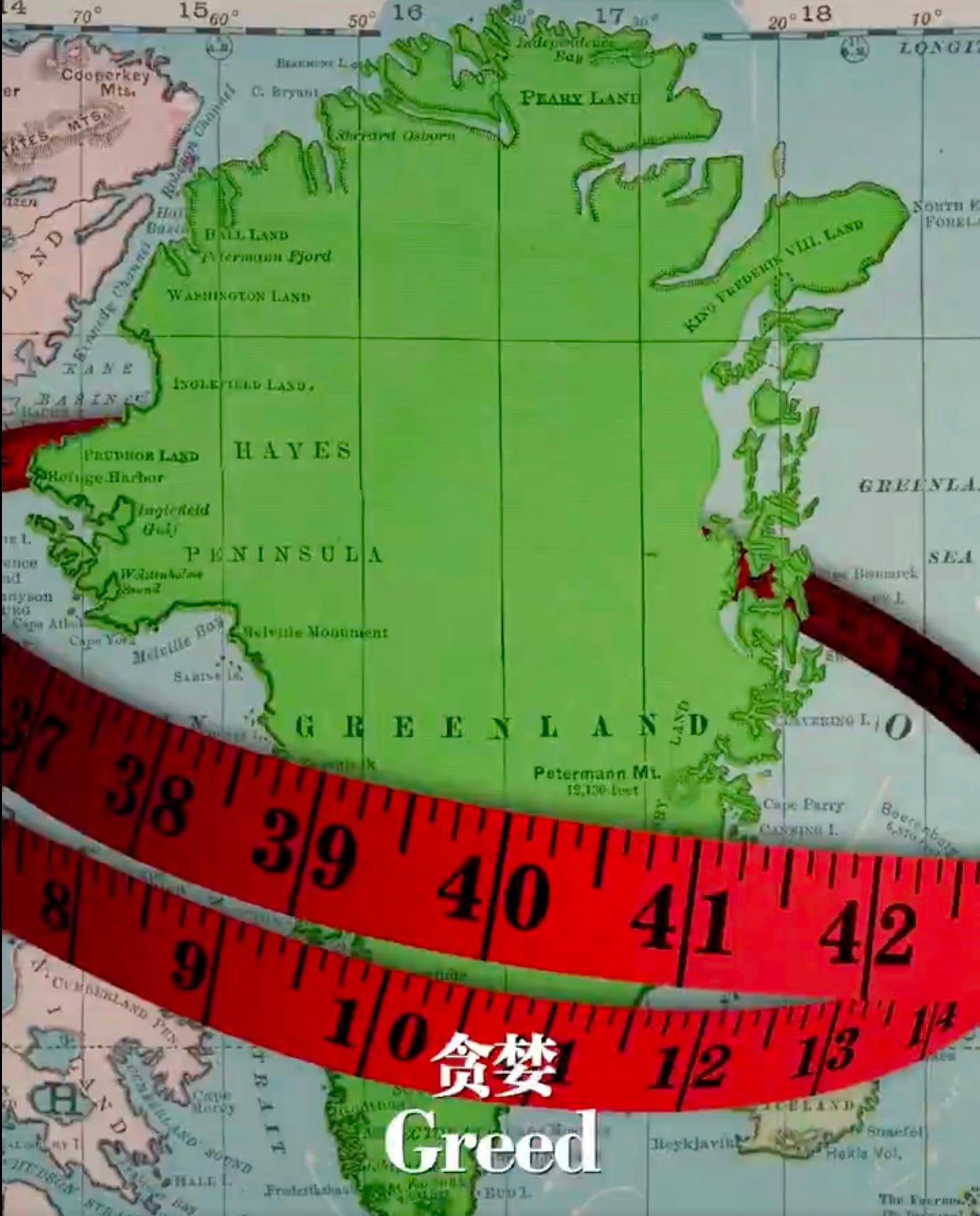
The world, certainly, is topsy turvy. Long a shrewd observer of CCP rhetoric and narrative framing, I have found myself turning the same analytical skills to political language everywhere — from Hong Kong (see the “Short Stories” section below) to Washington. I recommend those interested in the latter subscribe to the e-mail feed at the Federal Register, where executive orders like this recent one are logged.
There are lessons to be learned everywhere these days about overreaching power and its false and corrosive use of language.
But enough from me. On to the stories. And don’t miss the short interview at the end on the Myanmar quake with Taiwanese journalist Will Yang. Enjoy!
David L. Bandurski
CMP Executive Director
SPOTLIGHT
Sea-Drill Drama
China intensified naval exercises around Taiwan to flex its muscles; Commonwealth Magazine's data team visualized the maneuvers with a superb public tool.
The People's Liberation Army (解放軍) began joint military exercises around Taiwan on Tuesday this week, calling Taiwan's President Lai Ching-Te a "parasite" in the latest escalation of Beijing's months-long pressure campaign against Taiwan that is also a test for the United States. According to PLA Eastern Theater Command spokesman Shi Yi (施毅), the drills involve army, navy, air force and rocket forces conducting "multi-directional approaches to Taiwan island," focusing on sea-air combat readiness, control of key areas, and land and sea strikes.
State-run Xinhua News Agency (新華社) said the exercises aim to test joint combat capabilities while serving as a serious warning to "Taiwan independence separatist forces" (台獨分裂勢力). This follows two previous military exercises conducted in the Taiwan Strait (台海) in March. The PLA described the action as "legitimate and necessary to safeguard national sovereignty and maintain national unification."
The military maneuvers come amid heightened tensions following President Lai's labeling of China as a "hostile foreign force" and recent shifts in U.S. diplomatic language regarding Taiwan. Beijing has consistently declared Taiwan a "red line" in China-U.S. relations and views Lai's Democratic Progressive Party with particular hostility for what China insists on calling its “pro-independence agenda.”
Last week, Taiwan's Commonwealth Magazine (天下) launched a free interactive data tool that maps PLA activities around Taiwan. The "Map Explorer" (地圖探索) function displays real-time trajectories of Chinese military aircraft and vessels, revealing PLA hotspots. Users can filter dates, play/pause movement tracking, and click on red dots to examine detailed maps.
SHIFTING LINES
Paper Signals
As Beijing tightens its grip on Hong Kong, the newspapers that matter have changed — and when Ta Kung Pao speaks, the city's power brokers now listen carefully for signals from above.
The controversy surrounding Li Ka-shing's proposed 23 billion dollar Panama ports deal, which has angered China, reveals a fundamental shift in Hong Kong's political media landscape, according to Chris Yeung, former Ming Pao editor and now head of Green Bean Media (綠豆). Yeung wrote that Ta Kung Pao (大公報) and Wen Wei Po (文匯報) — both papers controlled by the central government's Liaison Office in the city — have replaced the South China Morning Post as the city's most politically influential publications, becoming "first-to-read" newspapers for government officials and business leaders alike.
When Ta Kung Pao condemned CK Hutchison's ports sale as "groveling" and "betrayal," it demonstrated the direct line between these publications and official policy positions. "Pro-democracy activists read looking for signs of imminent trouble," Yeung wrote, highlighting the papers' role as Beijing's political barometer. In an update on that story this week, China’s Caixin Media reports that Pacific Century Group, the Hong Kong conglomerate run by Li Ka-shing's son, Richard Li, has openly distanced itself from CK Hutchison and the now politically toxic deal.
Changing media dynamics in Hong Kong were further illustrated late last month when Security Secretary Chris Tang (鄧炳強) publicly criticized Ming Pao for "misleading" reporting. After a Ming Pao journalist questioned why Tang hadn't announced his Thailand trip, Tang accused the paper of trying to "undermine public trust." When the paper’s deputy chief editor defended the question, Tang responded with a letter condemning the "biased" coverage (See “Short Stories” below for more on Tang).
For a rundown of the Li Ka-shing story in Chinese, see Fang Ming's (方明) take at Initium Media (端傳媒), which notes "more and more discussions are focusing on the risks of U.S.-China competition."
CMP HIGHLIGHTS
Don't miss these key stories at the China Media Project and Lingua Sinica over the past week.
"China Chatbot 17" | The latest edition of this must-read bulletin examines Baidu's problematic integration of DeepSeek-R1 (promoting anti-Semitic conspiracy theories), profiles key AI policy strategist Gao Wen, and covers the latest model releases as competition intensifies in China's AI sector. LEARN MORE.
"China's AI Dragnet Exposed" | Hundreds of gigabytes of leaked data reveal how China is using artificial intelligence to automate surveillance of online discourse, with sophisticated systems prioritizing military, social, and political content for monitoring and control. LEARN MORE.
"Stepping Into Emptiness" | Two former Hong Kong reporters share their psychological trauma from covering the 2019 protests, describing how they navigated professional boundaries during the crisis and now cope with displacement abroad after their media outlets were shuttered under national security laws. LEARN MORE.
"Toxic Silence Broken" | Chinese media outlets have taken the unusual step of openly covering a thallium contamination crisis in Hunan's Leishuei River that local officials kept hidden for a full week, with residents stockpiling water despite official assurances of safety. LEARN MORE.
"Pen Names with Purpose" | A recent Economic Daily commentary under the pseudonym "Jin Guanping" warns against wasteful local government investments, illustrating how China's state media uses coded bylines to signal institutional positions on key policies. LEARN MORE.
IN THE NEWS
Open Boxes
Teen's doxxing raises questions about Baidu's data security
Late last month, Chinese search engine giant Baidu weathered a storm when the 13-year-old daughter of Vice President Xie Guangjun (谢广军) exposed critics' private information online — raising suspicions the data came from inside Baidu. The practice, known in China as "open boxing" (开盒), refers to exposing someone's private information online. At a March 20 press conference, security director Chen Yang (陈洋) presented evidence claiming "no employee at any level has access to user data." Baidu attributed the leak to "overseas social engineering databases" rather than internal sources. Despite showcasing its security framework and announcing an "anti-doxxing alliance," public skepticism remains intense, with many Chinese netizens declaring they "won't dare use Baidu anymore."
(NOT) IN THE NEWS
Deadly Blunders in Bangkok
When a skyscraper built by a Chinese state company was the only to collapse during the recent earthquake, China's first response was not rescue but information lockdown.
A 7.7 magnitude earthquake struck Myanmar and Thailand last Friday, with only one of Bangkok's 142 skyscrapers collapsing—the State Audit Office building under construction by a Chinese state-owned enterprise. The collapse killed 15 people with 72 still missing. As Thailand launched an investigation, China Railway No. 10 Engineering Group promptly deleted promotional materials about the project. Chinese authorities censored domestic coverage, removing news articles and social media posts mentioning the incident, while continuing to promote positive stories about China's earthquake response elsewhere.
Check out the full article on the China Media Project website.
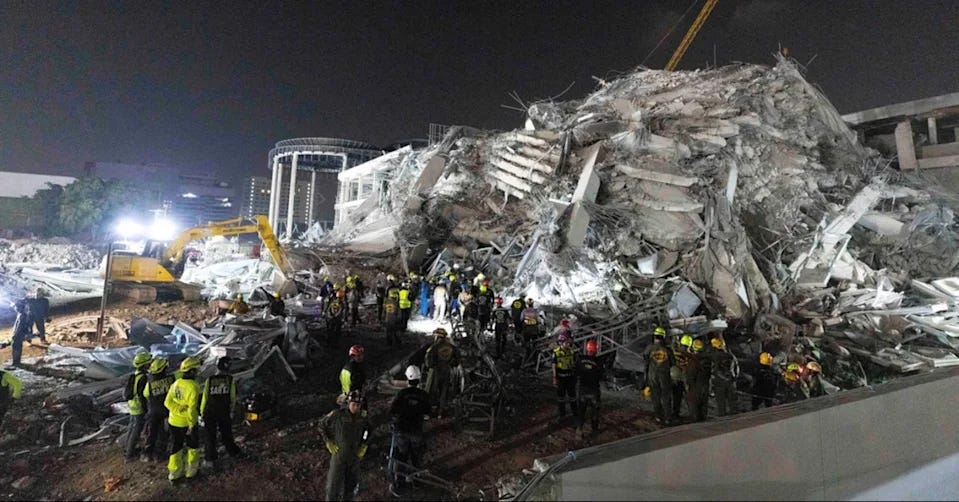
REDLINES
Red Seas Ahead
The crimson hues of Chinese Communist Party loyalty have washed across the country’s education system in the past decade.
In yet another local manifestation of what the CCP calls “ideological and political education” (思政教育), or sizheng, a national program to ensure that students adhere to the political line of the party, young cadets at Shanghai Maritime University (上海海事大学) are now receiving an education that anchors maritime training to party history.
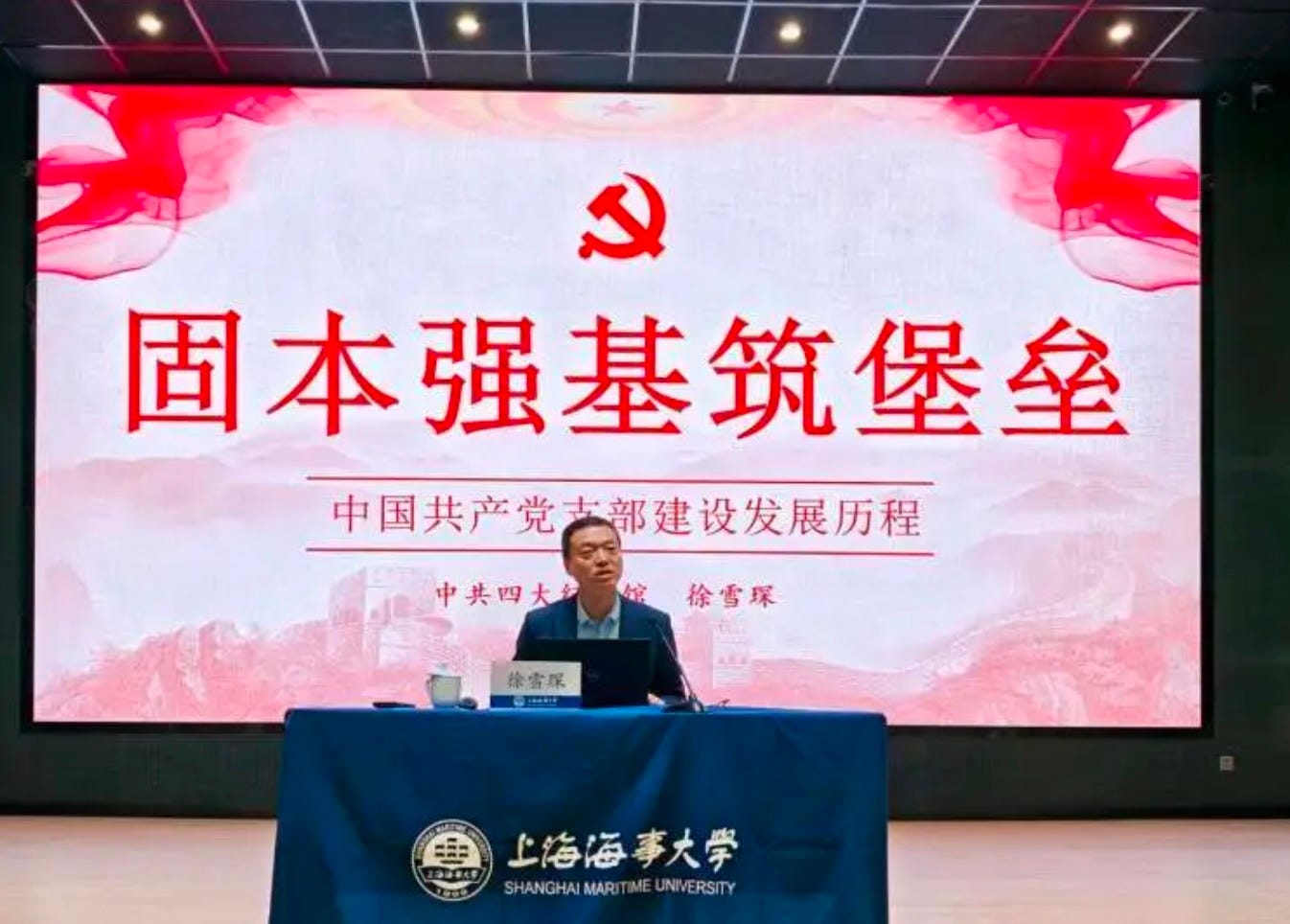
On March 27, students at the university, which specializes in shipping, transport and maritime industries, sat for a lecture from Xu Xuechen (徐雪琛), a top official from Shanghai's local museum of the CCP's founding, who instructed them in how to effectively integrate "red stories" (红色故事) into seemingly non-ideological subjects like maritime studies. This unapologetic process of ideological insinuation has been a cornerstone of sizheng since Xi Jinping's campaign in 2019 to reinvigorate the practice, which has its origins in the 1940s.
According to a report in the Shanghai Morning Post (新聞晨報), a commercial daily under the city’s CCP mouthpiece, the motto of the sizheng program at Shanghai Maritime University is "Red + Blue + Special" (红色+蓝色+特色), combining the party’s cardinal color with the university’s official blue (also a symbol of its maritime associations). Special? Yes, we’re stumped too. But according to university officials, the program aims to cultivate "new maritime personnel who have ideals and responsibility, are willing to endure hardships, and are brave in their struggle."
Somewhere, we might imagine, key maritime skills are also involved — like navigation.
SHORT STORIES
| Hong Kong |
More Targets for Tang
Hong Kong Security Secretary Chris Tang (鄧炳強) publicly criticized a social media-based publication called Edu Lancet (教育刺針) last Friday for spreading rumors and "dividing society" after it raised questions — “sensationalizing,” Tang called it — about the death of a Hong Kong student during a Hangzhou exchange program. Tang also warned against "soft resistance" (軟對抗), a concept authorities in the city have increasingly used to describe acts of peaceful expression that allegedly undermine government authority. The case was covered by a number of outlets, including Points Media (棱角媒體) — a global media collective of former Hong Kong journalists.
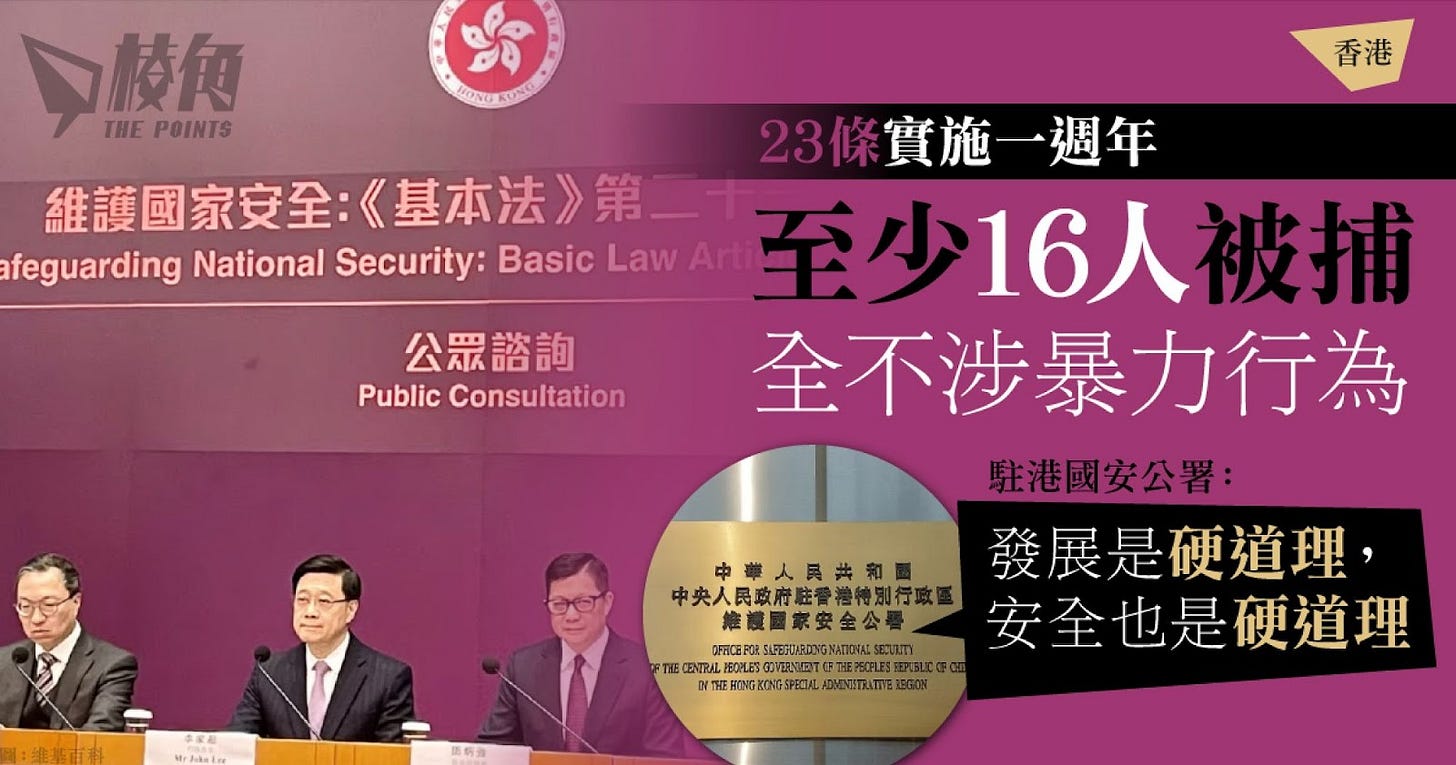
This push against peaceful expression was reflected in a report last month by Amnesty International that showed that at least 16 people have been arrested in the past year under Article 23 —known as the Safeguarding National Security Ordinance — for actions such as wearing protest-slogan T-shirts.
At a symposium last month marking the one-year anniversary of the ordinance, officials warned that while “development is an unyielding principle” (发展是硬道理 ), “security is also an unyielding principle" (安全也是硬道理). In a rather stark illustration of China’s dominance of Hong Kong politics, this pairing was a direct copying of a phrase introduced on March 1 by Xi Jinping during a collective study session of the CCP Politburo. The first phrase, about development, echoes a core concept introduced in 1992 by Deng Xiaoping (鄧小平). The latter phrase is apparently Xi’s own recent elaboration, and likely speaks to the CCP’s sense of anxiety about the volatility of the present moment.
| China |
Tattle Page for Taiwan
China's Taiwan Affairs Office (國務院台灣事務辦公室), a ministerial-level agency focused on pressing China's territorial claims and often involved in disinformation campaigns targeting Taiwan, launched a new website column on March 26 encouraging people to report "Taiwan independence" (台獨) activities. Later the same afternoon, Chinese state media reported that the snitch page — essentially an attempt at participatory propaganda — had received 323 reports from the public, including accusations against Liu Shih-fang (劉世芳), Taiwan’s interior minister, and a number of legislators for the country’s Democratic Progressive Party.
According to a report by Taiwan’s United Daily News (UDN), Chinese Academy of Social Sciences researcher Chen Guiqing (陳桂清) warned that "Taiwan independence thugs" would face the mainland's "powerful anti-independence punch" while criticizing President Lai's actions as promoting "anti-Chinese sentiment.”
| Taiwan |
Goodbye, Golden Opportunity
American YouTuber LeLe Farley (樂樂法利) was denied entry to Taiwan in late March despite holding an employment gold card, stemming from unauthorized paid TV appearances in 2023. The National Immigration Agency explained that Farley had violated immigration laws by receiving compensation for political talk show appearances during the 2024 presidential election campaign while on visa-free entry allowing him to travel in the country — but not to “work.”
"My dream shattered," said Farley in a YouTube video, describing how he had sold his car in the US and was excited about "starting a brand-new journey" only to be rejected at the border.
Who Knows Taiwan?
Taiwanese YouTuber Chung Ming-hsuan (鍾明軒) sparked controversy after suggesting on a podcast that "nobody knows Taiwan" abroad and that he therefore must resort to explaining himself through "Chinese culture" (中華文化) to allow foreigners to relate. Given the social, political — and often highly personal — debates in Taiwan about identity vis-à-vis a China that aggressively asserts its sovereignty over the island, Chung's comments naturally reverberated. Fellow content creator Ray Du (阿滴) countered on Threads that 80 percent of foreigners he met when traveling overseas recognized Taiwan and understood when he identified himself as Taiwanese. This led to accusations that Du was "bullying" Chung, who claimed his words were taken out of context. With the usual appetite for drama, Taiwanese media waded in, unpacking the raucous back and forth.
Ceylon (錫蘭), a Belgian-Chinese YouTuber popular in Taiwan, initially criticized Du but later apologized after speaking with him directly about the misunderstanding. Those who can stomach rapid-fire influencer commentary can try out the related video below from another YouTuber, History Bro (歷史哥).
Teacher's CCTV Interview Draws Criticism
Taipei First Girls' High School Chinese literature teacher Alice Ou (區桂芝) sparked controversy after criticizing President William Lai (賴清德) in an interview with China's state broadcaster CCTV. Ou questioned Lai's description of China as an "external hostile force" (境外敵對勢力), stating that she still wanted to visit her mother and relatives in China.
Mainland Affairs Council Deputy Minister Liang Wen-chieh (梁文傑) called Ou’s comments "really inappropriate" and suggested authorities evaluate her suitability to teach at the prestigious school, which was attended by the daughter of former president Ma Ying-jeou (馬英九) as well as Zheng Li-jun (鄭麗君), a politician for the Democratic Progressive Party (DPP) who served as culture minister and deputy premier.
Buckle up. Hugely divisive controversies like this one seem to be on the rise in Taiwan.

| Macau |
Painting Macau Red
Macau is intensifying patriotic education efforts targeting young people through "different levels and aspects," according to a report by All About Macau (論盡) — an independent news outlet launched in May 2013 that focuses on in-depth reporting on social issues in Macau. At a closed-door Youth Council meeting held on March 25, Social and Cultural Affairs Secretary O Lam (柯嵐) emphasized that "President Xi Jinping is very concerned about the development of Macau's youth." She outlined such initiatives as "red root-seeking journeys" (紅色尋根之旅) — essentially, junkets for youth from Macau that involve trips to “red tourism” sites like the birthplace of Mao Zedong.
According to All About Macau, the territory’s Education and Youth Development Bureau said it would promote patriotism through methods "appealing to young students," cultivating the core social value of “loving the country and loving Macau.” This case exemplifies the ongoing efforts in both Hong Kong and Macau to systematically integrate mainland Chinese patriotic education — equating love of country with unconditional support for the CCP regime.
| Singapore |
How Do You Say “Wet Market”?
Singapore's Promote Mandarin Council (推廣華語理事會), a government-supported body comprising representatives from private and public sectors to cultivate Mandarin usage, published a database collecting more than 1,100 Chinese words drawn from the local community. The bilingual publication "From Selat Pagar to Singapore" (從石叻坡到新加坡) includes terms across nine categories, with entries like "kopitiam" (咖啡店) — a special type of local coffee shop — and "wet market" (巴刹).
Lead researcher Associate Professor Tan Chee Lay (陳志锐) told Singapore’s Lianhe Zaobao (聯合早報) that the database serves as "an important carrier of Singaporeans' cultural identity" and "a linguistic bridge for new immigrants and foreign friends to understand local society."
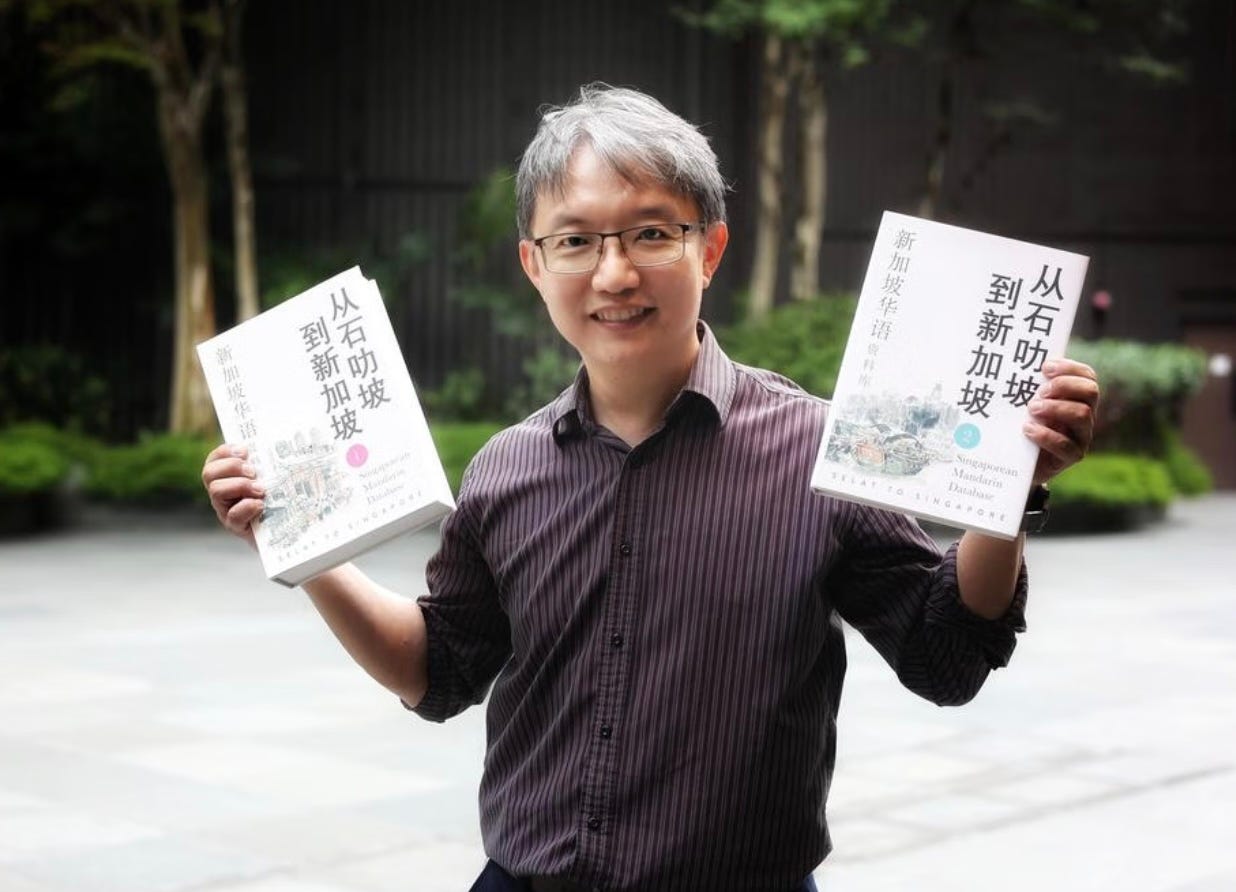
| Malaysia |
Pushing “Peaceful Unification” in Malaysia
The Malaysian One China Peaceful Unification Promotion Association (馬來西亞一中和平統一促進會) defended itself against accusations of spreading communist ideology after coming under police investigation, Malaysiakini reported. The organization is modeled after China's Council for the Promotion of Peaceful National Reunification, which oversees over 200 similar chapters in 91 countries as part of the CCP's United Front Work Department (UFWD) activities to promote Chinese unification policies abroad.
Federation of Chinese Associations Malaysia president Tan Sri Ng Tian Chuan (吳添泉) expressed concern about the investigation, Malaysia’s Sin Chew Daily (星洲日報) reported, stating that Malaysian Chinese organizations' adherence to the government's "One China" policy is "completely unrelated to politics or communism" and should not be misconstrued as "promoting communist thought" (宣揚共產主義思想). He noted that since 1974, Malaysia has been the first ASEAN country to establish diplomatic relations with China.
QUOTE/UNQUOTE
Eyes on the Quake Zone
As Myanmar's devastated earthquake region remains closed to most journalists, a seasoned correspondent from Taiwan shares how disaster coverage unfolds under military rule.
CMP’s Dalia Parete reached out to freelance journalist Will Yang (楊智強), the founder of the independent outlet Border Eyes (邊境之眼), which focuses on Myanmar and Southeast Asia, to discuss the near-impossible challenge facing the press as they try to cover Myanmar's devastating 7.7-magnitude earthquake under military junta restrictions. Yang recently wrote a piece on this issue for Taiwan’s United Daily News (UDN).
Lingua Sinica: Is it possible for foreign journalists to enter Myanmar right now to cover the earthquake? What are the challenges and potential ways to get in?
William Yang: The military spokesperson announced that they don't accept foreign media. Major media from the West, Taiwan, Japan, and Korea probably cannot enter. But NHK and AFP still have some personnel inside Myanmar who can assist. The obstacle is that you'd need to sneak in without a press visa. They won't issue press visas, so maybe you get in on a tourist visa, which for them is illegal. This is already dangerous for you.
If you're a TV reporter with big equipment or a microphone, it's almost impossible. You could do it with a small gear or a cell phone, but it's very dangerous. People will fear being interviewed because they know it's unsafe, especially if they're illegally doing news activity.
Lingua Sinica: How has the military government's approach to press freedom since the 2021 coup created a particularly challenging environment for disaster coverage?
William Yang: The damage is too devastating. The government doesn't have enough manpower, equipment, or resources to help its people. They don't want the press reporting on these shortcomings. It's all about the government fearing bad press that would expose their lack of infrastructure to respond effectively. Even in Sagaing City, I heard 80 percent of buildings are damaged—the disaster is simply too massive. They probably don't want international society to know they're incapable of handling this. They seem to care more about their image than their people. After the past four years, this is sadly credible.
Screenshot of a video from China News Service that shows the aftermath of the Myanmar earthquake. SOURCE: Wikimedia Commons.
By blocking press access, they're deliberately controlling information. Additionally, the civil war has worsened the disaster response, as ordinary people now view anyone in military uniform as an enemy or threat. The government has lost public trust. Even if officials genuinely try to help now, citizens remain skeptical, creating a significant obstacle to effective disaster relief.
Lingua Sinica: Reporters from what countries can enter Myanmar?
William Yang: Russian, Belarusian, and Chinese reporters are there because they're allied with the junta. They trust each other and won't allow the situation to spiral out of their control. Their primary goal is to protect their interests with all parties involved. The junta trusts Chinese state journalists, who can enter to report on what their rescue teams are accomplishing, creating a mutually beneficial arrangement.
Lingua Sinica: Are you seeing any strategies that local or international journalists are developing to continue reporting on this crisis despite the restrictions?
William Yang: Even today, I'm trying to connect with people inside Mandalay. There are independent journalists who had contacts in the city before the earthquake. I asked them to film hospitals and the airport, which has shut down, to understand why. They've captured footage but can't transmit it.
The internet connection is too poor. We can communicate by text, but sending large video files has been impossible all day. Everyone is trying. Everyone wants news from inside Myanmar. However, broken internet remains a major obstacle to getting information out, and VPNs don't help with speed issues.





